|
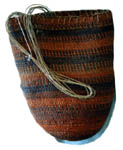
Arhnem Land Woven Conical Bag
Traditional
handcrafted 'Dilly Bag'. This bag features a tightly woven
decorative effect, created with pandanus fibres. The fibres
have been dyed with natural bush colours and are interwoven
to produce a stunning horizontal striped effect.
Artist : Judy Baypungula
Size : 40cm (16") L x 30cm (12") W
(Soon to be available through an online auction house)
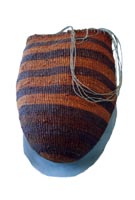
Ramingining
Woven Bag $ 270.00 AUD 
Traditional
handcrafted bag, referred to as a 'mindirr' or dilly' bag.
The bag features the stunning decorative effect, created with
pandanus fibres, coloured with natural bush dyes.
Artist
: Judy Baypungula
Size
: 40cm (16") L x 30cm (12") W
Mindirr
$ 150.00 AUD 
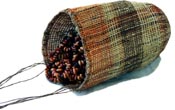
Traditional
handcrafted pandanus string bag; multiple rich ochre colours
made with natural bush dyes, large cylindrical shaped. The
bag features a tightly woven and uniquely textured decorative
effect.
Artist : Rosie Rodji
Size : 40cm (16") L x 25cm (10") W
Ramingining
Pandanus Bag $ 235.00 AUD 
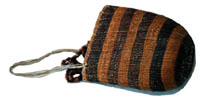 Traditional
handcrafted pandanus bag; often referred to as a 'mindirr'
or 'dilly bag'. This personal bag has been woven with deep
shades of orange and reddish-brown to produce a horizontal
striped effect. Traditional
handcrafted pandanus bag; often referred to as a 'mindirr'
or 'dilly bag'. This personal bag has been woven with deep
shades of orange and reddish-brown to produce a horizontal
striped effect.
The
woven items produced today are made with as much care and
reverence as they have been for centuries, being made for
utilitarian and ritual purposes as well as for the outside
market. As with weapons and utensils, there has been some
adaptation to suit the Aboriginal people's changing way of
life and demands of Balanda (European) market. New techniques
have been introduced at various stages in their history and
some of these have been mastered and adopted in the constant
experimentation that keeps that art exciting and dynamic both
for those catering it, and the many discerning admirers of
their art.
Artist : Elsie Bulung
Size : 30cm (12") L x 25cm (10") W
The
Creation Process
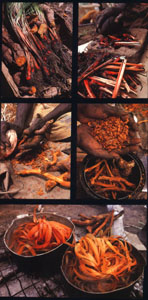 Watch
the creation process on video! Traditional Aboriginal Australian
Baskets are made from woven pandanus fibre, dyed and decorated
with ochre. The three youngest bunches of leaves from the
top of the Gunga (pandanus spirilis) or Screw Palm is hooked
down by a long stick, and the prickly edges stripped off with
the thumb nail. Watch
the creation process on video! Traditional Aboriginal Australian
Baskets are made from woven pandanus fibre, dyed and decorated
with ochre. The three youngest bunches of leaves from the
top of the Gunga (pandanus spirilis) or Screw Palm is hooked
down by a long stick, and the prickly edges stripped off with
the thumb nail.
On
their return from the bush, the women strip the long leaves
into several fibres, bundle them up and hang them to dry.
Weaving may commence at this stage and the finished article
left 'white' or decorated with ochres, or the fibres are beautifully
coloured with natural bush dyes. The Gunga is then skilfully
woven into many beautiful and useful items.
See
and read more about the brilliant colours used!
Decorative
Effects
The
interaction of the two linear elements (horizontal and vertical
strands) creates patterns in colour, light and shade. A particular
decorative effect that can be achieved is horizontal stripes
created by varying the colour of the strands through the full
dye potentials. These fibre constructions are unquestionably
fine art.
Check
out the
source to find out more!
|

